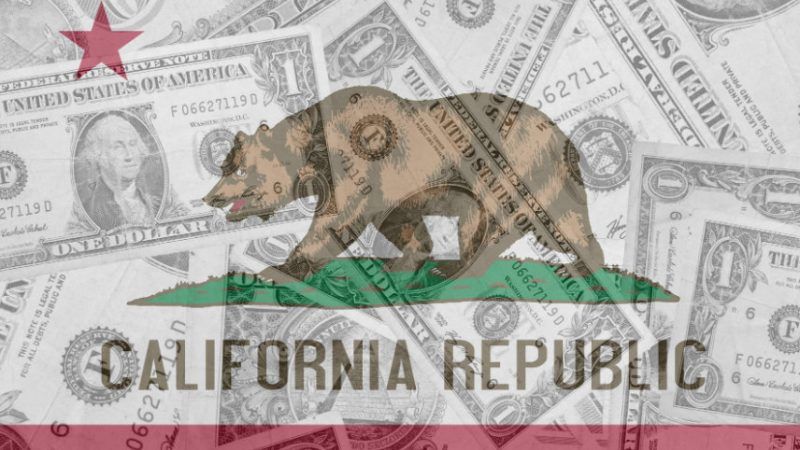California's 'Taxpayer Transparency and Fairness Act' Resulted in Less Transparency, Fairness for Taxpayers
Now it's clear that gutting the state's old tax agency was bad for taxpayers.

It's a rule of thumb. One should always expect the opposite result of whatever any government agency promises. The War on Poverty created a permanent underclass that perpetuated poverty throughout generations. The War on Drugs did much to erode our civil liberties, but mainly has emboldened the drug cartel. The examples go on and on.
That brings us to California's taxing authorities. After scandals at the Board of Equalization—the Orwellian-named agency that had collected sales, use and special taxes—the Legislature gutted it and largely replaced its functions with two new bureaucracies. The 2017 legislation was called the Taxpayer Transparency and Fairness Act. As you might have guessed, since its implementation a few months ago, the state's tax proceedings have become less transparent and less fair to taxpayers.
The BOE, which dates back to the second California Constitution in 1879, is the only tax-collection agency in the nation that's administered by elected officials. It is run by four elected board members plus the state controller. After last year's law, the four elected officials no longer have much to do even though the board still has a few functions.
As with any elected body, it has for decades been plagued by scandals ranging from allegations of nepotism to accusations of misspending. Governors from both parties have for years tried to gut the agency. Expressing a common sentiment, columnist Dan Walters complained that the "agency has become steadily more politicized, with the board's four directly elected seats treated as either well-paid sinecures or stepping stones to higher office." Controversies including elected officials "interfering with pending tax cases" have been going on for decades, he wrote.
Those criticisms have some validity. But isn't it a good thing that politicians get involved given that they typically intervene to help the taxpayer? There's no reason that the state couldn't have audited the agency and implemented reforms. Every agency (even the Legislature itself) has controversies. Instead, the Legislature gutted the board and the results are discouraging.
Let's look at taxpayer "fairness." Since the new process has gone into effect, not one of the more than 20 income-tax-appeal cases has gotten a single vote in the taxpayers' favor. The BOE used to hear 10 to 20 sales- and use- and special-tax appeals at each board meeting, but the new Office of Tax Appeals has yet to hear any of those tax cases. The Legislature hammered the BOE for its backlog, but now it's worse. The BOE would make a decision the same day by vote. Now it can take up to 100 days while interest and penalties add up.
How about transparency? The old Board of Equalization would televise its hearings and archive them so anyone can view the proceedings. That way everyone, including reporters, can see whether a business is being treated fairly or getting the bureaucratic back of the hand. Those proceedings can also be used if the case ends up in court. The new tax-appeal agency posts transcripts, but has yet to televise or archive the hearings, so it's no longer fully transparent.
There are many stories of business owners who felt like they were getting a raw deal or being treated in a heavy-handed manner by the board, yet who were able to get help from their elected representative on the BOE. That was a reasonable way to level the playing field.
The Board of Equalization also had the incentive to solve vexing tax-policy problems. For instance, legal marijuana dispensaries are required to pay taxes, but because of federal laws they are not allowed to have bank accounts. But they weren't typically allowed to haul sacks of cash into BOE offices, either. BOE's officials worked with the dispensaries to help them safely pay their bills in cash. These practical solutions are more likely to be driven by an elected board with constituents than a bureaucracy with subjects.
The main reason the BOE had been a target is obvious. State officials are tasked with maximizing revenue to assure that tax collections match state spending. Anything that reduces that tax flow is a bad thing, from their perspective. Because elected officials need votes and often have their eyes on higher office, they have an incentive to help taxpayers, which means that sometimes the board would reduce the size of the tax payments.
By the way, the new tax authorities have significantly increased their own administrative budgets from the old BOE days. The Department of Finance gives reasonable explanations for some of the growth (standard increases in pay and benefits, new IT and other start-up costs, artificially deflated final year spending for the BOE as its powers were reduced), but we see the spending trajectory. It's going up, now that the administrators are in charge.
Bottom line: A reform designed to boost transparency and taxpayer fairness has reduced both of those things. No one should be surprised.
Steven Greenhut is Western region director for the R Street Institute. He was a Register editorial writer from 1998-2009. Write to him at sgreenhut@rstreet.org. This column was first published in the Orange County Register.


Show Comments (11)